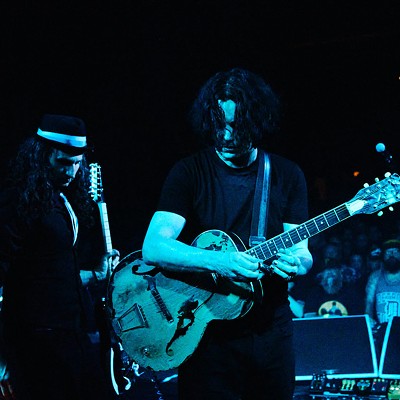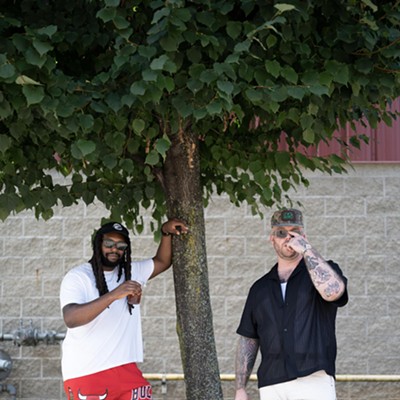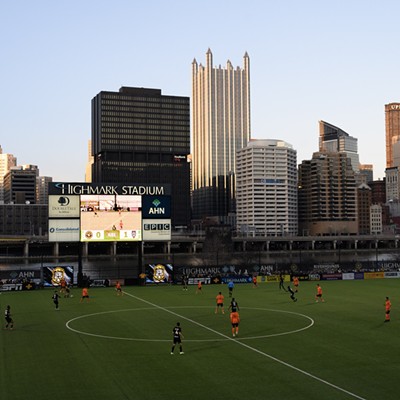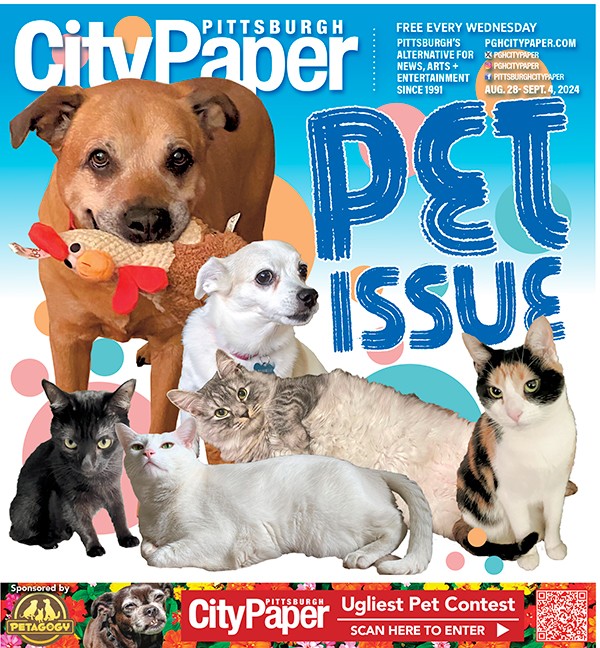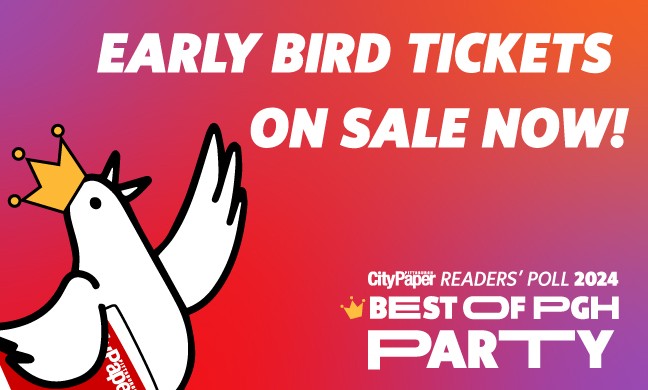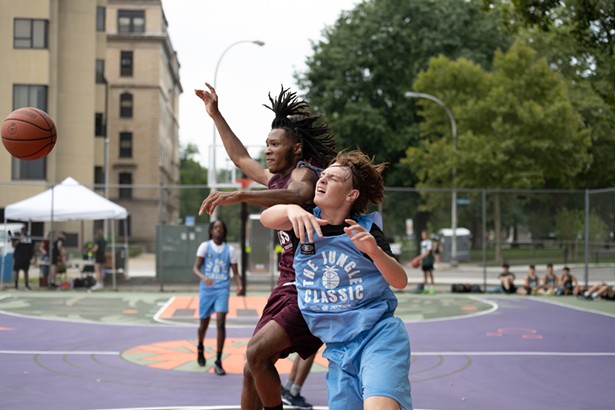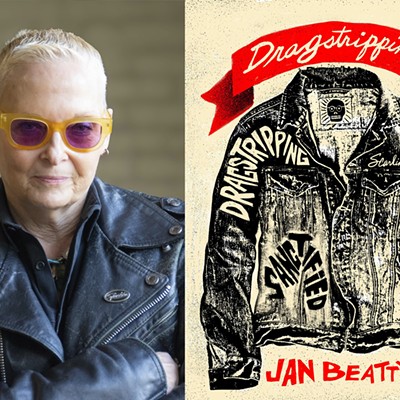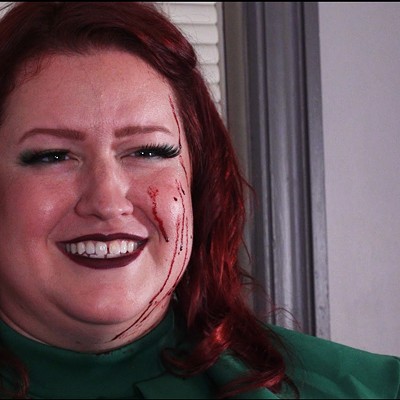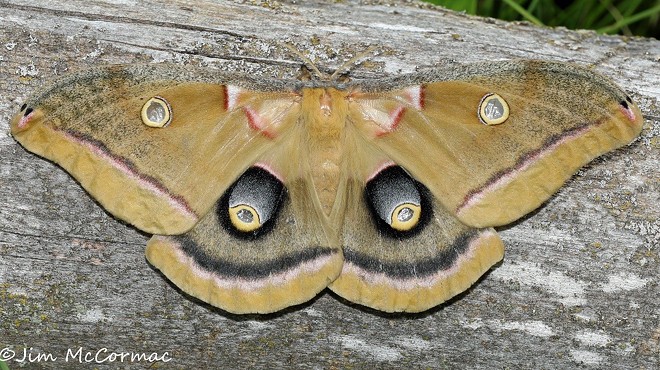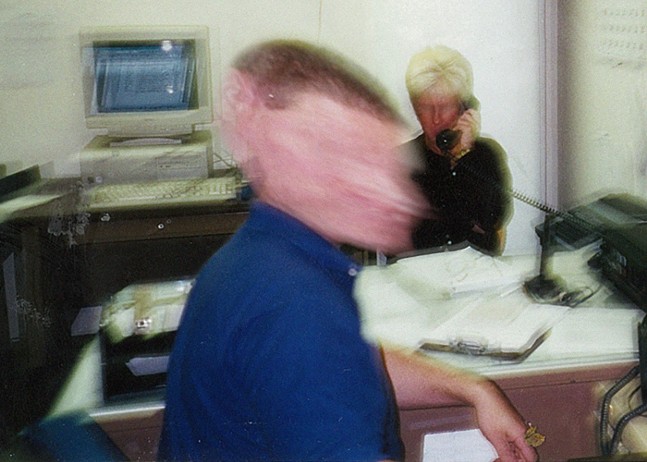
Photo: Courtesy of They Are Gutting a Body of Water
Album cover for lucky styles by They Are Gutting a Body of Water
TAGABOW fits into this swirling scene, and since releasing two small tapes now limited to YouTube crate-digging, and the 2018 clear-eyed album gestures been, the band has grown from a one-off bedroom project into a four-piece that specializes in music that is equal parts pile-driving and mischievous.
TAGABOW — which consists of Dulgarian, drummer Ben Opatut, lead guitarist
P.J. Carroll, and bassist Emily Lofing — originated out of the ashes of Jouska, Dulgarian’s former project from Albany, N.Y. that made emo-adjacent music influenced by the pop-punk strains of hometown rockers Prince Daddy and the Hyena. You can hear traces of Jouska’s angst in TAGABOW’s early music, though, these days, the band mostly pulls from drum-and-bass and hardcore styles, along with the occasional glitched-out drum beat.
The band's latest album, lucky styles, continues to do what they do best: billowing guitar-forward tunes delivered with the excitement of being able to pull it off. It’s an album where an instrumental heavy-hitter like “behind the waterfall” is paired with “kmart amen break,” which fades away with high-pitched voices singing about death like a children’s choir.
If you're having trouble finding lucky styles, try searching for s (Dulgarian explains in the interview below).
In addition to fronting TAGABOW, Dulgarian is the brains behind Julia’s War Recordings, a record label that has put out releases from Feeble Little Horse and Gundy, two Pittsburgh bands charting their own interesting shoegaze-adjacent music.
Pittsburgh City Paper talked with Dulgarian ahead of TAGABOW’s East Coast tour, during which they’ll be playing a sold-out show with Momma on Tue., Jan. 24 at Club Café.
How are you guys feeling about the tour?
Dulgarian: Excited. I love regional tours because they’re kinda easy to tackle. And I don’t know, it doesn’t feel like a massive undertaking. There’s so much that goes wrong in a longer tour. Not to say — knock on fucking wood — but, you know, getting down to Virginia and over to Pittsburgh and then back home is pretty easy.
How has moving to Philadelphia had an impact on your music?
D: I moved here quite a long time ago at this point. I used to travel through here; I played in this other band [Jouska] for a long time and felt like this place was pretty sick. I remember going to shows and every show having at least one band that was phenomenal, that was doing something completely different. All my favorite bands from that time were from here. You know, Blue Smiley and Alex G were from here and Spirit of the Beehive was kinda starting to come up… So many fucking bands were here. And I was like, this place absolutely rules, and I wanna be there.
And not for nothing, Philly is a very cutthroat place. It’s kinda funny because, for the first two or three years, I literally had no friends. I suppose I had some friends, and I slowly made friends, but people here are very reluctant to allow you to be a part of it because there are so many people. I spent a lot of years genuinely cutting my teeth, trying to build a community, constantly putting on shows, helping out my friends, putting out this label, putting out tapes for my friends.
When you’re like 15, 16, 17, you have these, like, main character moments, where you think everything is about you. Or you go to your first house show and you’re like, wow, my life is like an indie movie. And it’s really important to realize over time that that is not real. You’re a person, like everyone else. And I think being humbled by living in Philly is one of the most important parts of making music. Because for a while I was making music that I don’t think was really that good. And I think that, once I got here, I was like damn, I really have to get started on making things that I think are worth listening to.
That early TAGABOW stuff — the self-titled tape from 2016 and sweater curse from 2017, the stuff that’s only on YouTube now — was that just you making the music?
D: My friend Jevan Dollard played drums on it because I’m not a very good drummer. We played in Jouska together when I lived in Albany. And right around the time I was moving or deciding to move, I started making stuff on tapes.
The Jouska stuff wasn’t exactly where my head was at. I really wanted to make heavy music, and a lot of the Jouska stuff was emo-ish adjacent, because that was the scene up there. I was listening to a lot of Teen Suicide and stuff like that, and I had just got a tape machine and made those songs in one shot. I was like, ok, cool that’s it. And when I started writing gestures been, which I guess was late 2015 into 2016, I was like, ok this is more of what I want to do. At that time, I was really in love with Horse Jumper [of Love] — I was enamored by that shit — so, that’s a lot of the inspiration behind gestures been.
So your new album is called lucky styles, but on streaming it shows up as s. Was there a reason for that?
D: It was a mix-up at first and then we just let it rock. I said it originally as a joke to one of my homies, and then when it went on streaming, that’s what it was called. Then I started thinking about it more, and the original reason it was a joke was because I wanted it to be like an experiment in names, and, I suppose, modern technology. Like, what are people gonna call this thing by word of mouth? Are people gonna remember it as s or are people gonna call it lucky styles, which is what it’s actually called?
On the topic of labeling, I read an article recently that lumped TAGABOW’s sound in a growing new wave of East Coast American shoegaze music. Are genre and your contemporaries and where you fit into that scene something that you think about when you make music and tour?
D: No! I’m answering "no" to your question of, "do you fit into that?," because ultimately, no, I think that those are shoegaze-proper [bands]. That’s not what we’re doing.
I think that, in a lot of ways, the whole “Philadelphia Shoegaze” thing is a meme among my friends and I at this point. But I think it’s important to realize that what we’re doing here is different, it’s not like straightforward shoegaze. And I think that’s because we’re walking in the footsteps of bands like Blue Smiley and Spellbinder.
I think that's what’s happening here, and in Pittsburgh as well. Pittsburgh has Gundy, Pittsburgh has Feeble Little Horse, Pittsburgh has Gaadge. There are so many phenomenal bands, like Ex-Pilots, in Pittsburgh. I just think that we’re kinda doing things different here.
And it’s wacky. It’s always been wacky here. Like, motherfuckers are using children’s keyboards on every song. You know, Alex G set the tone with pitch-shifting his voice and now he’s on the auto-tune wave. There are things here that aren’t happening elsewhere.
One of the things I really dig about the new album, and I could say this about most of your music, is that you guys are having fun with it. I think a lot of people only associate shoegaze/shoegaze-adjacent music with head-down, depressing vibes, but the sampling work on “threes” and melody on “delta p” are pretty playful.
D: Again, that’s that wacky Philly shit. Here’s the thing, I feel like Philadelphia in general, and any place where youth culture is prevalent, is steeped in irony. Almost to the point where it’s like beyond irony. We talk about loving Smash Mouth or something, but we genuinely love Smash Mouth. I think that that brand of irony is pretty pervasive because of the internet or whatever.
But in that same fucking breath, I think that there are elements of what we do as a “shoegaze band” that is very stereotypically shoegaze. I play completely turned around. I play not facing the crowd. So, as opposed to staring down at my pedals, I’m staring at the band. So, in that realm, we’re kinda like a shoegaze band, proper.
But in the presentation of things, it’s so silly. In a lot of ways, we’re just making fun of things.
I wanted to ask you about that — playing with your back to the audience. Does that help you focus in on the music?
D: There are multiple reasons. When I played in Jouska, I faced forward, and when I locked eyes with someone, I felt like I had to be a performer. But I’m not a performer, and I want it to be exclusively about the music.
So, with my back to the audience, it feels like you're looking in on a band practice, and that makes it more about music than a performance. I’m not knocking performance. I just know that I’m not good at banter in between songs. I play little interludes in between songs because that’s not what a show is about for me.
Another reason is just so that I can hear the PA. If we play in front of the stage and facing the stage, I can hear the PA, and I don’t need the monitors to hear my vocals.
Another reason is so that we can lock eyes with each other and make sure we’re in it.
Another reason is that people can then go in a circle around us. I want to be eye-level with everyone there.
Are you ever worried that you’ll get hit in the back by someone moshing?
D: I always get hit in the back. All the time. I have this huge guitar strap with metal spikes all over it for that very reason.
I’m not gonna tell people not to mosh. If you’re at a show and wanna get rowdy that’s fine. That shit is exciting as hell. We played this crazy show at Kansas City a few months ago where these kids were just running into us.
I want to ask you about a specific show — how the hell did you guys land that gig at a Sonic Drive-In in South Jersey?
D: A homie just hit us up about it. A booker in Philly. There was word of mouth about it. As soon as they promoted it, I was like, “Yes, absolutely.”
That was a fun show, but, like, none of the interludes worked, it was weird. We played with this beatdown band, and they were brutal as fuck.
So, in addition to fronting TAGABOW, you also run Julia’s War Recordings. Was starting a record label always a goal of yours?
D: Definitely not. It wasn’t something I really set out to do. I think that once you earn respect and trust in a community — because there are so many people out there who are negative forces — it’s kind of your responsibility to bring people up in any way, shape, or form of success that you are having.
I think that that’s what Julia’s War presents itself to me, as a way to help my friends out, even if it’s just making tapes or being part of a family of artists that I believe in. I kind of feel like that’s my duty. And I love running a label. It’s so much work, and it’s nearly bank-less work, but, ultimately, I think that it's totally worth it.


